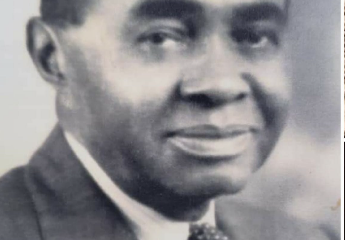Featured
Black Americans Honor ‘Where We’ve Come From’ With Thanksgiving Holiday

Americans are racing through airports, loading up cars and making trips to the grocery store in these final hours before Thanksgiving 2022. For many this year will mark the first spent with extended family since 2019 — the year before the coronavirus pandemic shifted holiday gatherings from in-person to virtual or very small guest lists.
“I usually go to my mom’s,” says Rodney Ben Rogers who is known for his lavish feasts and culinary talents. “She hosts our family Thanksgiving dinner so I’m not cooking, but everyone knows I’ll make dressing and have a Thanksgiving meal any day of the week.”
At Katherine Moore’s home, the desserts are ready. She and her husband Larry are hosting up to 12 family members for dinner. Her sister and her husband from Dallas will join them.
“We haven’t celebrated Thanksgiving together since we were kids,” Moore shares. “So she’s coming down with her granddaughter. We’re also expecting her son and his wife.”
Moore’s children and grandchildren won’t have to travel far for dinner. Smoked turkey along with macaroni and cheese are being prepared, and the desserts include sweet potato pie, egg custard pie and cheesecake.
But the star of the dinner is gratitude.
“It’s a time of reflection to give thanks for where we’ve come from to where we are,” she explains. “And it’s a time to share the tradition of Thanksgiving for our grandkids. It’s a teaching moment for our grandkids — where we come from whether we are talking about slavery or the 1960s and the Civil Rights Movement when I came along … it’s about where we’ve come from.”
Early African American celebrationsWhen the decree for the 13 colonies to celebrate a victory over the British at Saratoga was issued by the Continental Congress, the year was 1777. They marked the occasion in December. It was a time of slavery in America, yet the enslaved also took part in the victorious event.
Over the years, the holiday evolved as a tradition to express gratitude for rain during droughts and bountiful harvests. Historians say the holiday often presented a small window for some of the enslaved to escape. With a relaxed work schedule and fewer plantation staff on hand, it offered a rare opportunity to reach for the freedom so many longed to experience.
President George Washington declared November 26 a day of giving thanks in 1789. He issued a proclamation “for such a day sprung from the Almighty’s care of Americans prior to the Revolution, assistance to them in achieving independence, and help in establishing the constitutional government.”
And beginning in 1863, President Abraham Lincoln encouraged Americans to recognize the last Thursday of November as “a day of thanksgiving.” Lincoln’s proclamation came a month after a pivotal victory by the Union Army at Gettysburg.
The fourth Thursday in November was designated Thanksgiving until 1939 when then-President Franklin D. Roosevelt moved it to the third Thursday. As the Depression wore on, Roosevelt hoped to give American shoppers and merchants more time between Thanksgiving and the start of the Christmas holidays to conduct business.
Years later opportunities to kick off the season by shopping still beckon, and Moore — like millions of other Black Americans — will take time to peruse the early Black Friday bargains. But for her, the rich meaning of Thanksgiving transcends stocking her shopping cart.
“The Founding Fathers came from England on ships to start a new country. Our people came over in the bottoms of ships, and yet they still made it,” she said. “Even though we are not still enslaved, our plight hasn’t always been an easy one. As Black people, we can have Thanksgiving every day because of our history of struggle. As our ancestors said, ‘We know from whence we’ve come.'”

-

 Black History5 months ago
Black History5 months agoThe untold story of a Black woman who founded an Alabama hospital during Jim Crow
-

 Featured9 months ago
Featured9 months ago‘No Closure’ In Town Where Five Black Residents Were Either Murdered, Died Suspiciously Or Are Missing
-

 Black History9 months ago
Black History9 months agoBlack History Lost and Found: New Research Pieces Together the Life of Prominent Texas Surgeon and Activist
-

 Featured9 months ago
Featured9 months agoFounder of “The Folding Chair” Podcast Calls Montgomery’s Brawl ‘Karma’
-

 Featured8 months ago
Featured8 months agoThousands ‘Live Their Dream’ During National Black Business Month
-

 Featured10 months ago
Featured10 months agoJuneteenth And ‘246 Years Of Free Labor’ Are Key To Conversations About Reparations

